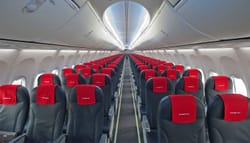I’ve never been happier to be a statistic.
After much delay and beginning December 4th, airlines will finally be required to file monthly reports on the total number of wheelchairs and scooters they carry, as well as how many are damaged in transit.
The FAA Reauthorization Act, signed into law by President Trump earlier this month, gave new life to a long-awaited regulation that was finalized in 2016, but had been delayed by Secretary of Transportation Elaine Chao. Last year, under pressure from Delta Air Lines and the lobbying group Airlines For America, Chao granted a stay on implementation of the regulation for at least one year, to January 1, 2019.
But now, thanks to the hard work of disability advocates, the support of Congress and the President’s signature, there will be no further delays.
According to an advisory published today in the Federal Register, U.S. airlines must “separately report statistics for mishandled wheelchairs and scooters for domestic scheduled flights they operate beginning December 4, 2018 and through December 31, 2018.” The deadline for reporting data for the period ending on December 31 is January 15, 2019. Airlines will be expected to include the number of mishandled wheelchairs and scooters, and the total number of wheelchairs and scooters enplaned.
The requirements of this regulation extend only to carriers that have accounted for “at least 1 percent of domestic scheduled passenger revenues for calendar year 2018,” of which there are 12. Per the DOT, those carriers are Alaska Airlines, American Airlines, Delta Air Lines, Envoy Air, ExpressJet Airlines, Frontier Airlines, Hawaiian Airlines, JetBlue Airways, SkyWest Airlines, Southwest Airlines, Spirit Airlines and United Airlines.
Because the regulation applies only to domestic flights, major foreign carriers operating international service to/from the United States will be exempt, including Air Canada, Air France, British Airways, Emirates, Lufthansa, Norwegian, WOW and many others.
I am eager to see this data reported, as it will reveal two very important things. First, we’ll discover exactly how many passengers who have a wheelchair or scooter of their own are traveling by air in the United States. Second, we’ll learn how many wheelchairs are damaged, how frequently such incidents occur, and which carriers do a better job of safely transporting mobility devices.
Looking to the future, I will lobby for additional detail in the reported data, including wheelchair type (manual or electric) and approximate weight.
This data will help customers make informed decisions about which airlines to fly with. In the best-case scenario, the data will encourage competition among carriers with respect to the disabled passenger experience. Which airline will set itself apart as the “carrier of choice” for wheelchair users?
Next year, when the data is first released to the public, be sure to check back here for additional reporting and commentary.
What factors do you consider when booking an airline ticket?
How will data on wheelchair damage impact your decision making?
Let me know in the comments below!















